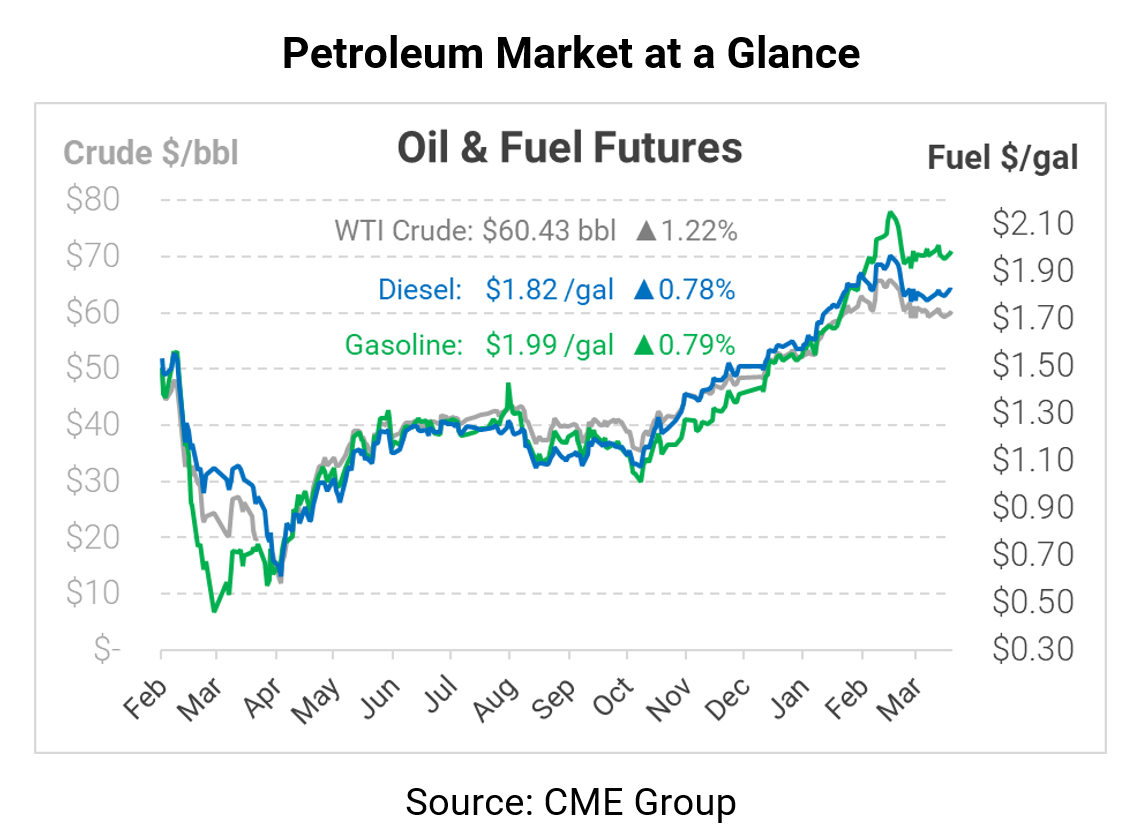
China’s Digital Yuan – Does It Matter to Oil Prices? (Hint: Yes)
Oil continued its streak of closing near $59/bbl, which has continued since April 6. Markets are caught in a holding pattern – news continues circulating around OPEC+ raising production, COVID lockdowns, and vaccine deployments. Strong demand data from China is providing support for prices this morning, as markets focus on fundamentals over headlines. The headlines, though, are taking a bearish slant – Johnson & Johnson’s US deployment has been paused due to concerns over 6 patients (out of 6.8 million) developing rare blood clots. With little “new” news today, we’re turning our attention to a less direct market mover: China’s new digital currency.
Over the past week, some financial headlines have begun highlighting China’s efforts to develop a digital yuan, known officially as the Digital Currency Electronic Payment (DCEP). Although still in trials, some experts suggest that the new digital currency could have a number of concerning features, especially regarding privacy concerns and its ability to circumvent international sanctions.
In some ways, the digital currency isn’t particularly novel – how much cash do you actually touch each day? Between credit cards, mobile payment solutions, and direct deposits, most consumers are already doing most of their transactions digitally. Digital yuan would simply replace the normal yuan in your account. The difference lies in what governments could do with the currency. Some have speculated that China could place expiration dates on currency to incentivize spending. The currency would also feature “controllable anonymity”, meaning third-parties don’t see your transaction data but the government could track suspicious activity.
Unlike Bitcoin, which is decentralized and not backed by any government, the digital yuan would be underwritten by the Chinese government. This support would make the payment less speculative and more stable, which could make it more popular for investors. Like Bitcoin, though, the digital yuan could be sent to another country easily without complicated banking transactions.
This last feature is particularly concerning for the US and its allies. Most international sanctions operate by restricting bank transactions – since nearly all international commodities trade in US Dollars, only people with access to the dollar can trade. When the US restricts Iran’s or North Korea’s access to the US Dollar, they restrict them (and any parties or banks who work with them) from global trading. The digital yuan wouldn’t require a bank to send funds – it simply transfers from one party to the next. This would allow China to circumvent sanctions without their banks losing access to US-denominated foreign capital.
By offering an alternative to the dollar for international trade, China’s currency could undermine the US Dollar’s world reserve currency status. Today, oil prices and the US Dollar are inextricably linked – every tick higher or lower for the US Dollar Index reverberates through oil markets, and the “petrodollar” has been at the heart of the world’s love for US currency. Should the reserve currency status eventually subside, it would trigger massive inflation in the US and force the country to slash government spending and reign in the trade deficit. It’s likely a long way in the future, but developments like the digital yuan make it necessary to continue monitoring the US Dollar and its preeminence – its slip could spell painful price increases and spending cuts in the future.
This article is part of Daily Market News & Insights
MARKET CONDITION REPORT - DISCLAIMER
The information contained herein is derived from sources believed to be reliable; however, this information is not guaranteed as to its accuracy or completeness. Furthermore, no responsibility is assumed for use of this material and no express or implied warranties or guarantees are made. This material and any view or comment expressed herein are provided for informational purposes only and should not be construed in any way as an inducement or recommendation to buy or sell products, commodity futures or options contracts.






